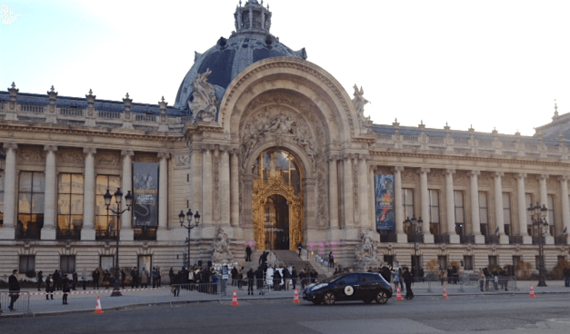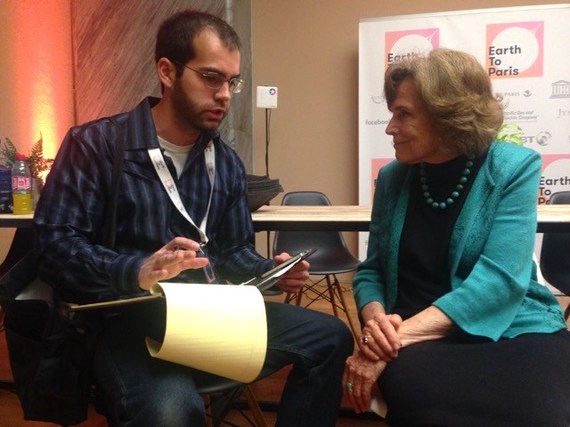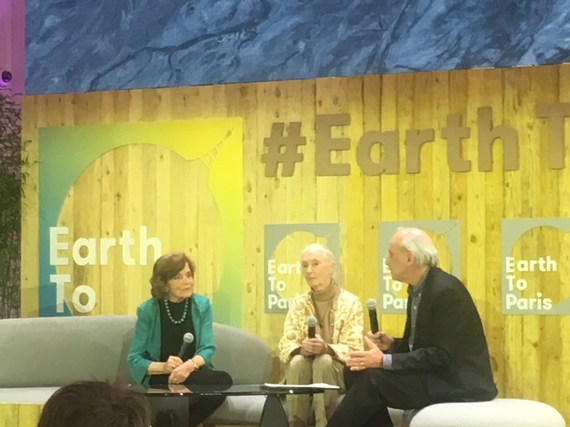
"You've got 10 minutes," said the President of Mission Blue. She guided me to Dr. Earle (known as "Her Deepness" at the New York Times), who smiled at me as I sat down.
"I'll make this quick," I said, opening my notebook. "You were the rapporteur for the 2012 People's Summit at the UN Conference on Sustainable Development, or Rio+20, where you had a major role in promoting ocean conservation. So my question is, why isn't ocean conservation on the agenda for COP21?"
The Doctor grinned. "I'm not the right person to ask, because I'm asking the same question. It's baffling," she said. "At the conference, the headline was, 'What is the future we want?' That's still the question. We have the answers, but we're a little slow at putting those answers to work."

Le Petit Palais, site of the Earth to Paris summit, December 7, 2015. (Photo Credit: Pierce Nahigyan)
If you're a fan of the ocean, and a semi-decent reporter, you do your best to wipe the stars out of your eyes when Sylvia Earle looks your way. The woman possesses an uncanny aura, as if all that time spent under the ocean has altered her chemical structure. She speaks like the ocean, soft and sure, and yet the words are as trenchant as the tides. I was fortunate enough to speak to her this past month at the Earth to Paris summit held in conjunction with the Paris Climate Talks, or COP21.
Humans v. Elephants
"We know what to do," said Dr. Earle. "We must find alternatives to the burning of fossil fuel. Fossil fuels have gotten us to the point where we have transportation that is unprecedented, we have food that is unprecedented, we have communications that are unprecedented. But the greatest gift that we have from these assets is the knowledge that we have to change."
Dr. Sylvia Earle has been working in the ocean longer than just about anybody, and she has the resumé to prove it. The former Chief Scientist of the National Oceanic and Atmospheric Administration (NOAA), Dr. Earle is the founder of the Sylvia Earle Alliance, Mission Blue, the Chair of the Advisory Council of the Harte Institute, leader of the NGS Sustainable Seas Expeditions and is a National Geographic Society Explorer in Residence. In addition to her PhD from Duke University, she holds 27 honorary degrees and has authored more than 200 scientific, technical and popular publications, including 13 books. She's led 100 expeditions and logged more than 7,000 hours underwater. Where the ocean is concerned, the lady knows whereof she speaks.

Pierce Nahigyan with Dr. Sylvia Earle at the Earth to Paris summit, Dec. 7, 2015. (Photo Credit: Ariane Sims)
To Earle, the problem facing the planet is not merely that of climate change, but the lack of accountability to human actions in general. Pollution, the destruction of ecosystems, the loss of biodiversity, and the ignorance that perpetuates this chaos, is not a sustainable business model for the human race. Not if it wants to survive.
"Throughout all of human history, we have taken, taken, taken, from the natural world," said Dr. Earle. "All creatures, however large or small, do this as a way of making a living. Humans, though, have gone way beyond what elephants have done to the planet or what birds or what any fish in the sea is capable of doing."
Ignoring the Oceans
Before our time was up, I asked Dr. Earle if ocean acidification and ocean warming receive less attention than deforestation because their symptoms are not as visible to the naked eye.
"Part of the problem is that what the ocean delivers to us is not as celebrated," she said. "You can't see oxygen being generated by trees, carbon dioxide being taken up by trees, but we get that. We're beginning to understand the importance of forests. But the ocean has its forests, too. They just happen to be very small. They're very small in size but they're very large in numbers."
Half of the coral reefs are still in pretty good shape around the world, she said, though the other half is dead or dying. Meanwhile, deep-sea mining is on the horizon "to essentially clear-cut the deep ocean," she warned.

Drs. Sylvia Earle (left) and Jane Goodall (center) speaking at Earth to Paris. (Photo Credit: Nicole Landers)
The Good News
"With our technological capacity, we are literally destroying the very systems that keep us alive," said Earle. "The good news is, for the first time in all of our history, children are growing up in a world where we know what we're doing to the planet."
In her discussion with Jane Goodall earlier that morning, Dr. Earle concluded by telling the audience that we all have the power to do something. As a parting question, I asked Her Deepness how people can exercise that power on a personal level.
"Look in the mirror," she said to me. "What is your power? You're using it right now. You're communicating, you're taking what you can do as a magnifying voice for things you care about. Well, everyone can do some of that. We have new ways of every voice being heard."
If you want to change the world, she said, the first step is telling the world what you want.
